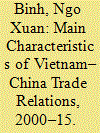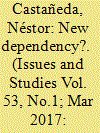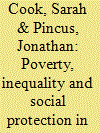|
|
|
Sort Order |
|
|
|
Items / Page
|
|
|
|
|
|
|
| Srl | Item |
| 1 |
ID:
133067


|
|
|
|
|
| Publication |
2014.
|
| Summary/Abstract |
Admiral Smith's point might be as valid today as it was sixty-four years ago. It refers to mines that he faced off the coast of Korea. Naval (or sea) mines are, by themselves or in combination with other weapons, a promising choice to parties pursuing antiaccess/area-denial objectives. The number of mines in the stocks of countries around the world and the ease of laying them mean that sea control is very likely to be lost again in future tension and conflict. This article is an attempt to describe the means, and to some extent the methods, under consideration to win it back if the need arises again. Mines pose a threat not only to military use of the sea but also to civilian shipping. The global economy depends on secure access to the global commons. With roughly 95 percent of world trade being shipped by sea, it is clear how much the economy depends on open trade routes and sea areas.1 Therefore, the capability to counter mine threats is needed to provide freedom of movement not only to one's own and friendly naval forces but to merchant shipping as well.
|
|
|
|
|
|
|
|
|
|
|
|
|
|
|
|
| 2 |
ID:
154726


|
|
|
|
|
| Summary/Abstract |
Entering the 21st century, trade relations between Vietnam and China have grown strongly, making
positive contributions to the economic development of the two countries. However, the relationship in
the period 2000–15 also witnessed a number of thorny issues such as a serious trade imbalance against
Vietnam, the ‘North to South’ nature in the import and export structure of the two countries, Vietnam’s
growing dependence on bilateral trade with China, and so on. These issues have affected negatively
Vietnam’s economy. Based on data analysis, the author identifies the key characteristics of trade relations
between Vietnam and China and highlights possible solutions for Vietnam to move its trade relations
with China in a more balanced direction.
|
|
|
|
|
|
|
|
|
|
|
|
|
|
|
|
| 3 |
ID:
156292


|
|
|
|
|
| Summary/Abstract |
This paper focuses on the most recent trends of Chinese finance (foreign direct investment (FDI) and development loans) in Latin America and their impact on economic development. In particular, this paper explores the economic and institutional factors that attract loans and FDI from China to Latin America. Based on data from the Chinese Ministry of Commerce and the United Nations on Chinese FDI and development loans to Latin America, this article argues that Chinese capital flows to the region, rather than politically motivated, are mainly motivated by trade interests, the evolution of the market of commodities, and natural resources-related policy goals. These capital flows are functional to the Chinese government’s use of soft power in the region, but these goals are secondary to market-based interests.
|
|
|
|
|
|
|
|
|
|
|
|
|
|
|
|
| 4 |
ID:
142439


|
|
|
|
|
| Summary/Abstract |
Excuse me, what is the time?” A seemingly innocent question. However, if you are a young Arab or Jew who looks “Mizrachi,” stopped in the center of West Jerusalem, there is a reasonable possibility that this question is not in the least bit innocent. In recent months activists of the racist Lehava organization have been roaming West Jerusalem, searching for Palestinian passersby or workers to attack and compel to flee from what they consider to be an exclusively Jewish area of the city. Since many Jewish residents of the city are themselves descended from immigrants from Arab countries, with dark skin as well as hair, and clothing styles consistent with global pop culture, Lehava activists often struggle to ascertain the identity of city residents and determine precisely who is “Jewish” and who is “Arab.” Therefore, they harass people walking by with “banal” questions such as “What time is it?” in order to pinpoint their ethno-national identity according to their accent.
|
|
|
|
|
|
|
|
|
|
|
|
|
|
|
|
| 5 |
ID:
121206


|
|
|
|
|
| Publication |
2013.
|
| Summary/Abstract |
This article focuses on environmental controversy in a Chinese rural community. It shows that Chinese villagers may protest against anticipated pollution if the environmental threat is effectively framed. In the face of real and serious pollution, villagers may seek to redress environmental grievances by piggybacking on politically favourable issues. However, when the pollution is caused by fellow villagers, environmentally concerned villagers may remain silent owing to the constraints of community relations and economic dependency. These findings suggest that the relationship between pollution and protest is context-dependent.
|
|
|
|
|
|
|
|
|
|
|
|
|
|
|
|
| 6 |
ID:
130049


|
|
|
|
|
| Publication |
2014.
|
| Summary/Abstract |
Social protection programmes have expanded rapidly in the developing world in recent years. In Southeast Asia, the experience of the Asian Financial Crisis of the 1990s heightened awareness of vulnerability to poverty and the role of government in protecting households from a sudden loss of employment and income, or from contingencies such as ill-health and ageing. Most governments have expanded targeted social assistance programmes, although the quality and coverage of these programmes vary from place to place. Public support for basic health and education services is also uneven. Common challenges in the region include economic risks associated with financial globalization, rapid urbanization, high levels of informal employment, rising dependency ratios and a highly unequal gender division of labour.
|
|
|
|
|
|
|
|
|
|
|
|
|
|
|
|
|
|
|
|
|